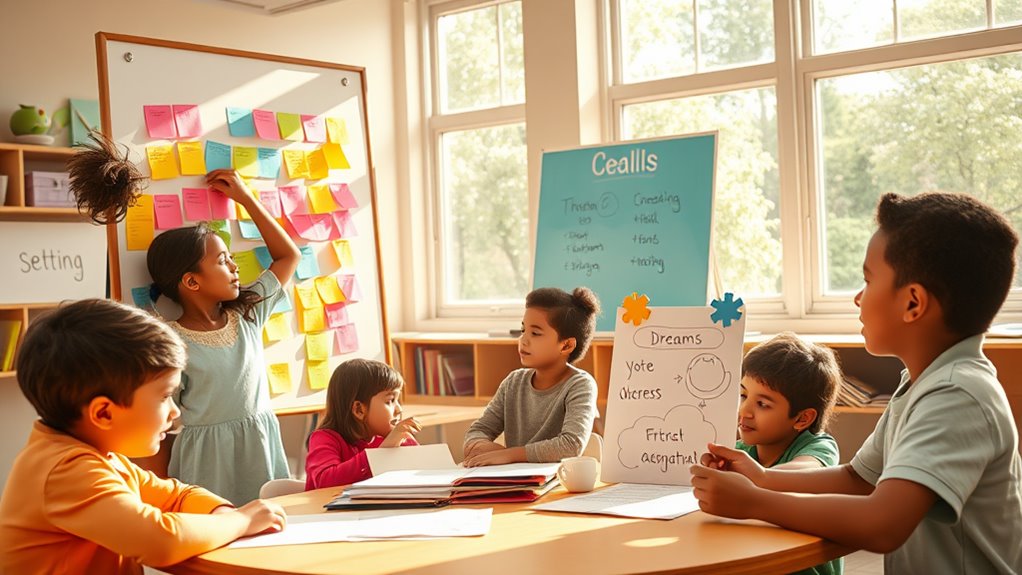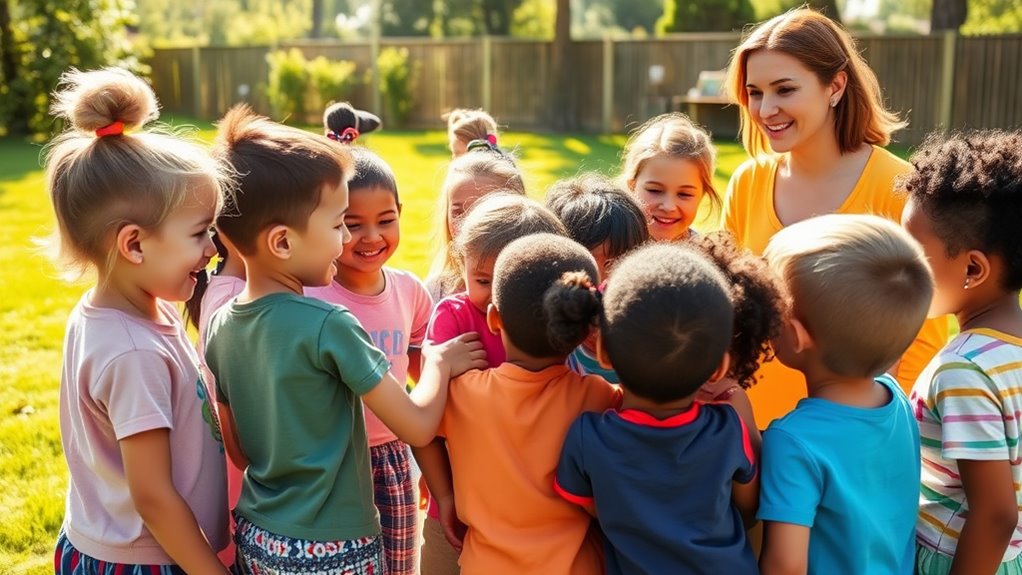Why Setting Goals Is Important for Kids of All Ages
Setting goals is crucial for kids of all ages because it gives them a clear path to success. When they set achievable goals, they build confidence and self-esteem. As they face challenges, they learn resilience and important life skills like time management. Younger kids can start with simple tasks, while older kids can set more complex goals related to their interests. This process fosters responsibility and accountability, encouraging them to reflect on their progress. By celebrating small successes, you can keep their motivation high. Keep exploring to discover more ways you can support their goal-setting journey.
Key Takeaways
- Goal setting provides children with a clear path, enhancing their focus and direction towards success.
- Achievable goals build self-esteem and confidence, motivating kids to strive for more.
- Setting goals teaches essential life skills like time management, perseverance, and resilience in facing setbacks.
- Age-appropriate goals foster responsibility and independence, preparing kids for future challenges.
- Celebrating milestones reinforces motivation and encourages a positive mindset towards achieving future goals.
Benefits of Goal Setting
Setting goals can be a powerful tool for kids, offering them a clear path to success. When you help your child set specific, achievable goals, you’re not just giving them a task; you’re providing a structure that encourages self-esteem building. As they work toward these goals, they’ll learn to believe in their abilities, which can foster a positive self-image.
Moreover, achieving these goals, no matter how small, leads to achievement recognition. Celebrating these milestones reinforces their efforts and motivates them to keep pushing forward. It’s essential to acknowledge their accomplishments, as this recognition can boost their confidence and inspire them to tackle even bigger challenges.
Goal setting also teaches kids valuable life skills, like time management and perseverance. They learn that setbacks are part of the journey, and they’ll develop resilience as they navigate through challenges.
Age-Appropriate Goals
When it comes to goal setting, it’s crucial to consider your child’s age and developmental stage. Each age group has specific developmental expectations that can guide you in setting age-appropriate goals.
For younger children, focus on simple, tangible goals that promote foundational skills. For example, mastering tying shoelaces or completing a short puzzle can instill a sense of accomplishment and boost confidence.
As children grow, they can handle more complex tasks. Setting goals related to schoolwork, such as improving grades in a specific subject or reading a certain number of books per month, aligns with their age-specific milestones. This approach not only nurtures their academic growth but also teaches them the value of persistence and hard work.
For teenagers, encourage goals that promote independence and responsibility. Goals like managing their own time for studying or taking on part-time work can help them transition into adulthood.
Fostering Responsibility in Kids
As children take on more complex goals, fostering a sense of responsibility becomes increasingly important. When kids set goals, they’re not just aiming for achievement; they’re also learning about responsibility development. By holding them accountable for their goals, you encourage them to take ownership of their actions and decisions.
Start by helping your child identify specific, achievable goals. Discuss what they’ll need to do to reach these goals and the steps involved. This process teaches them the importance of planning and commitment. You can create a checklist or a timeline to track progress, reinforcing goal accountability along the way.
Encourage them to reflect on their journey. Ask questions like, “What did you learn from this?” or “How can you improve next time?” This reflection fosters critical thinking and helps them understand that responsibility is a continuous process.
Celebrate their successes, but also discuss setbacks. This balance teaches them that responsibility includes learning from mistakes.
Enhancing Motivation and Focus
A strong sense of motivation and focus can significantly boost a child’s ability to achieve their goals. When kids learn effective motivation techniques and focus strategies, they become more engaged in their tasks and develop a sense of accomplishment.
Here are a few ways you can help enhance their motivation and focus:
-
Set clear and achievable goals****: Break down larger tasks into smaller, manageable steps.
-
Celebrate successes: Acknowledge their efforts, no matter how small, to keep their spirits high.
-
Create a distraction-free environment: Minimize interruptions to help them concentrate better.
Personal Growth Through Goals
Setting goals isn’t just about reaching a destination; it’s also a powerful tool for personal growth. When you set goals, you embark on a self-discovery journey that pushes you to explore your interests, values, and capabilities. This process helps you learn more about who you are and what you truly want in life.
Having a growth mindset is essential in this journey. It encourages you to view challenges as opportunities rather than obstacles. When you encounter setbacks, instead of feeling discouraged, you can see them as valuable lessons that contribute to your development.
By setting realistic and achievable goals, you create a roadmap to guide your growth while allowing room for reflection and adjustment along the way. As you achieve your goals, no matter how small, you’ll build confidence in your abilities. Each step forward reinforces the notion that you can overcome difficulties and adapt.
Ultimately, this journey of personal growth not only enriches your understanding of yourself but also equips you with essential skills that will serve you well throughout your life. Embrace goal-setting as a vital part of your growth, and watch as you transform into the best version of yourself.
Practical Tips for Parents
Helping your child set and achieve goals can be a rewarding experience for both of you. By actively participating in this process, you can foster their confidence and motivation. Here are some practical tips to ensure success:
-
Start Small: Begin with achievable goals to build momentum and confidence.
-
Incorporate Goal Tracking****: Use charts or apps to visualize progress, making it easier for your child to see their accomplishments.
-
Encourage Family Involvement****: Involve the whole family in goal-setting discussions, creating a supportive environment.
Make time to discuss goals regularly, and celebrate milestones, no matter how small. This reinforces the importance of goal tracking and keeps your child engaged.
Frequently Asked Questions
How Can I Help My Child Overcome Setbacks in Goal Achievement?
To help your child overcome setbacks in goal achievement, focus on resilience building by encouraging them to view challenges as learning experiences. Provide emotional support, reminding them that it’s okay to stumble and keep trying.
What Are Some Examples of Long-Term Goals for Kids?
Some long-term goals for kids include academic aspirations like achieving a certain GPA or mastering a subject, and athletic achievements such as completing a marathon or earning a spot on a competitive sports team.
How Do Cultural Differences Impact Goal-Setting in Children?
Cultural influences shape children’s aspirations like colors on a canvas. Depending on parenting styles, some kids may dream big, while others learn to value practicality. These differences create a unique landscape in goal-setting experiences.
Can Goal Setting Lead to Increased Anxiety in Children?
Yes, goal pressure can lead to increased anxiety in children. It’s crucial to balance aspirations with anxiety management strategies, helping them cope with expectations while fostering a healthy approach to achieving their goals.
How Can We Celebrate Our Child’s Goal Accomplishments Effectively?
Celebrate your child’s accomplishments with creative commendations! Use goal recognition and reward systems that resonate with their interests. Whether it’s a small treat or a fun outing, make each achievement a memorable moment to cherish.





